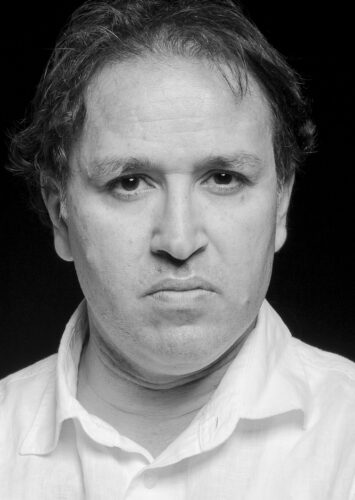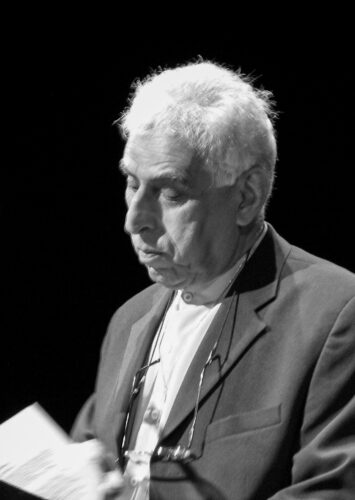(1) She, this town, is the fawn of history. And she is now, Eilat, borne of catastrophes and new dialects. And she is, in our pronunciation, and in the murmurs of our fratricide: Aqaba. She heals, like crystal grains, disorders in the pulse. A land of fighting for the prophet’s companions and later warriors. A poor oasis where Christ’s thorns grow. A path towards Mutah and Damascus and toward waves of engulfing, flaming sands. A climax or a rose from the desert’s inferno rushing higher and higher into whirling dust, then rising as cities and banners and ten castles where bristling brigades seek dust stars and prayers. . . . . . . . . . . . . . . . . . . . . . . . . . . . . . . . . . . . . . . . . . . . . . . . . . . . . . . A shattered T. E. Lawrence will moan near one of them. * No one in the castle / not even a park guard / only the sea / The fishermen left their boats for the cafe / The sun sets in Eilat / and the Ottoman Castle stays up dressed in its luxurious tatters / No shells from old cannons / No traces of bullets / the low walls are crumbling / and soon The restored stone wall will rise, clean and smooth / The minaret was completely poured as concrete / the engineer did not grant a single clay shingle its right / place in the air of history and sea / The lighthouse will be elegant in the cameras of the tourists who no longer come / The new crescent is not made of cement / It is copper that quickly rusts in the humidity of the shore / Castles are not born twice. Let's go to the bottom, then. Christian knights took firm steps toward what they will never attain: Mecca and its outskirts. Muslim raiders set this inauspicious castle, their first step toward what they’ll never abandon: The Levant and its trees. The Ottoman officers here had the junction of desert and sea, the first cannons thwarted what might come along the long road to Mecca, or what the sea might fling in. The scene is clear, clear as documentary cinema, and wounding. Let's go to the bottom, then. Let's put on masks, flippers, and lead belts and carry, like two camels, the food of our lungs. Let's throw ourselves into the deep where the blueness is another shore.
Scene Half an apple quietly dips behind the mountains leaving a pillar of light on the Gulf. No waves on the sea but the sky surrounding me hangs its purple shirts. My half apple disappears but like the neighborhood seamstress I still drape the heavens on my shoulders, her purple shirts.
(2) There is no sea between Egypt’s air and her sea, no sea between Jeddah’s air in the south and her sea. We have merged into the volcano’s basalt that rushed to separate two continents to unite us and seeped into our joints to make us forget her. . . . . . . . . . . . . . . . . . . . . . . . . . . . . . . . . . . . . . . . . . . . . . . . . . . . . . . The desert and its thorn will be shuttered to separate the volcanoes that birthed gods out of the basalt, gushing waters and bitterness that melts the soul. The desert and its thorns will be shuttered and it’ll push its poison into us. And we’ll forget everything, every sign in the universe except: Dahab / Sharm El-Sheikh / Nuweiba / Hurghada / Al-Durrah / Aidhab / The names leap like Red Sea fishes / leap until they reach Harar and Mukala in Hadramout, leap and jostle until Sohar and the Strait of Hormuz, and the land of the Tamils / leap and flip leaving us nauseous/ names and swordfish and dolphins / nymphs and sailors drunk with danger and storms / Egypt’s pilgrims will come / and camels will be loaded with the velvet suit that drapes the Kaaba / woven with Egyptian slowness in the maze of Fatimid Cairo. / “We are full of poison,” says the boy Rimbaud / brim full of history, of swords and spears, and these mountains that have strained our shoulders for millions of years / these black mountains / these rose mountains / these mountains of sand / Mountains and mountains / from Aqaba to Aden / When will a drop, a single raindrop, fall on them? / We are not drunk / We are dizzied by a history our children will not read / Dizzied by a sea that has been hell for seafarers for centuries. The railways uprooted by the politicized Bedouins / uprooted like rotten molars / the camels bought by military operators / We do not ride the sea / What do we do, then? What are you doing, Bedouin woman, with your beauty? With your reed-veined niqab and your leisurely walk? And your dark reddish lips tinted with walnut bark? And your clothes soaked all night in incense smoke? Where do I take you? At what hour will our hearts beat like mortar grinding your tribe’s coffee? I will draw you, my Bedouin beauty, embellished like a Christmas tree. I will draw you leaning on a camel or a dune. I'll draw your inimitable image a thousand times to sell it to delusive tourists.
Scene The old lighthouse is lightless. There are no more sailors in the small harbors only waves that delicately touch, like a cat, the café’s chairs. Smoke from the other bank. A ship takes off. And from a boat that sails past the old lighthouse fish nets hang.
(3) We will shut our ears to what the sea says. We’ll pay no mind to the setting sun or the dallying waves. We’ll be followers of this or this, our sustenance is what the caravans bring, flat bread, a handful of dates. We will forget how to paint with stars the desert’s awe and the never-ending roads. No sea to wash our dreams with salt, coral, and fish. No desert to seed the rose of mystery. We are hemmed between two convulsions, arm span after arm span. How did we get away? How can we keep the clamps apart? The minutes of sand will be our resting place and the hut made of straw? . . . . . . . . . . . . . . . . . . . . . . . . . . . . . . . . . . . . . . . . . . . . . . . . . . . . . . . . . Coral has disappeared and the hermit crabs rush to their shelter. * We have no camel, no ship / no tent, no home / but we can ask for shelter / Al-Aqaba is a crumbling inferno / The clan has become an old man / And the Sheikh is in a faraway town / Everything is deferred, like soldiers’ debts. Al-Aqaba is postponed/ the wars are in the books. And peace is in ledgers. And we, are neither riders nor sailors / We are in Aqaba, just so / We have to make shelter / Let it be rocks and tin sheets / let it be wooden boards from what the ships cast / let them be ropes and camouflaged sheets / let it be open air. We are orphans and this is how we built poor, old Aqaba, a refuge of dusty paths and bean soup and falafel shops / We have a few tea houses / our ten-penny tea / the frayed playing cards / Truck drivers and smugglers among Red Sea ports live in our hearts and bare rooms / Where are we going tonight? Romero’s Bar is open to the sea / Alcazar’s pub also / and at the Ali Baba corner / there are secret drinks and girls—if you wish / You prefer mint tea? / The Royal Scuba Club (soon to be sold) closes at four / Why are you giving me this sideways glance? Are you saying I’m not a good guide? / Let's go to Eilat... * Morning in Al-Aqaba is always early / fresh breezes and trees still drenched in night dew / The school children on the narrow street / carry hot loaves filled with falafel balls / In the fish market, tuna hang like lambs and /the barbers shake off their chairs / of what remains of yesterday's hair / Aqaba’s farmers (Egyptians) come to the market / with red radish, mint and coriander / The cafes on Turkish Bath Street have yet to open. * The old quarter groans from the noonday heat. Peace be upon you, son of Abdullah.
Scene The mountains are ashen, but the gray is peeling off, white / and blue like fog. The date palms are also bluing / In the distance at the tip of the universe gray clouds appear.

